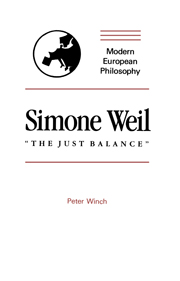Book contents
- Frontmatter
- Contents
- Acknowledgements
- 1 Introduction
- 2 The Cartesian background
- 3 The sensations of the present moment
- 4 “La simple perception de la nature est une sorte de danse”
- 5 Language
- 6 Necessity
- 7 Equilibrium
- 8 “Completely free action”
- 9 The power to refuse
- 10 “The void”
- 11 Geometry
- 12 Incommensurability
- 13 Beauty
- 14 Justice
- 15 “A supernatural virtue”?
- Notes
- Bibliography
- Index
4 - “La simple perception de la nature est une sorte de danse”
Published online by Cambridge University Press: 05 February 2010
- Frontmatter
- Contents
- Acknowledgements
- 1 Introduction
- 2 The Cartesian background
- 3 The sensations of the present moment
- 4 “La simple perception de la nature est une sorte de danse”
- 5 Language
- 6 Necessity
- 7 Equilibrium
- 8 “Completely free action”
- 9 The power to refuse
- 10 “The void”
- 11 Geometry
- 12 Incommensurability
- 13 Beauty
- 14 Justice
- 15 “A supernatural virtue”?
- Notes
- Bibliography
- Index
Summary
The position we have reached might be summarized as follows. In her very earliest writings Simone Weil's concern is already to elicit those features of human beings' lives which make it possible to ascribe to them mastery of concepts and the ability to know and understand. She is investigating what sort of creature a human being has to be in order to develop such abilities. In “Science et perception dans Descartes” she takes the notion of thinking, conceived in a quasi-Cartesian way, as her primitive starting point and argues that it is identical with pure activity. “Je puis done je suis.” But since the very purity of the activity, as she conceives it at that time, precludes its being a power “over” anything (since this would at once introduce an alien element of contingency into the exercise of activity), thought would have to furnish its own material for the development of its concepts: material completely within the power of thought itself. Descartes had attempted to show how this could be so, but his attempt failed: and necessarily so. Thought is essentially critical in nature and criticism requires something to be criticized. Sensationalist empiricism attempts to supply this material in the form of passively experienced sensations. But just because sensations, as they have to be conceived for the purposes of this argument, represent pure passivity, they do not possess any form or structure on which critical thinking could be exercised. In fact, so radical is the formlessness of such “sensations” that nothing at all can be said about them. They can have no place in an account of human understanding.
- Type
- Chapter
- Information
- Simone Weil: "The Just Balance" , pp. 32 - 47Publisher: Cambridge University PressPrint publication year: 1989



